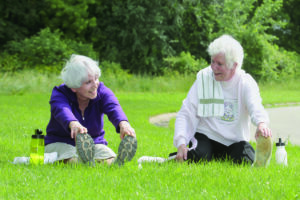Cut your risk of injury with these pre-workout tips

As physically active individuals age, they typically must change how they approach exercise.
For example, rather than jumping two feet first into new activities like they might have done when they were younger, those 50 and older may have to think about injury prevention and ways to improve their endurance prior to lacing up their sneakers.
For most, that may boil down to taking various pre-workout steps.
• Get enough rest.
The body requires adequate sleep and other rest during the day to stimulate muscle growth and repair. Exercise may not be as effective and it may be more dangerous if seniors are engaging without enough sleep. In addition, sleep deprivation can reduce reaction times, which can adversely affect workouts.
• Emphasize stretching.
Stretching can improve flexibility and reduce the risk of muscle injuries. It also can improve range of motion in the joints. Stretching before and after a workout prepares the body for exercise and helps it recover.
• Wear the proper footwear and clothing.
Sturdy, supportive athletic shoes and well-fitting workout wear can make working out more comfortable and safer. The National Institute on Aging recommends finding footwear designed for the specific activity you’ll be engaging in. Footwear that offers sufficient heel support and nonslip soles is beneficial as well.
• Warm up.
Give the body an opportunity to acclimate during a warm-up period that will facilitate healthy breathing. Warming up also loosens up the joints and muscles for the exercise ahead. After a workout, seniors should cool down to reduce their heart rates and prepare for recovery.
• Carefully consider pre-workout supplements.
Pre-workout powders and pills have become quite popular for exercise enthusiasts. Manufacturers may advertise that their products are loaded with vitamins and minerals that will help energize the body for a workout. However, they also may be fortified with caffeine.
Do not take a pre-workout supplement without first consulting your physician, as certain products may adversely interact with medications you’re taking for preexisting conditions.
Pre-workout steps can keep seniors safe and reduce injury risk from exercise.
